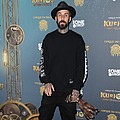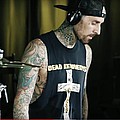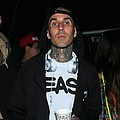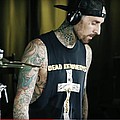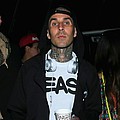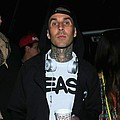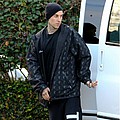Musician Travis Barker has admitted he was "doing lots of drugs" for most of his adulthood to cope with the pain of his mother's death.
The 39-year-old Blink-182 rocker is father to two children, 12-year-old son Landon and nine-year-old daughter Alabama, with ex-wife Shanna Moakler.
Travis' mother Gloria, who provided him with his first drum set ever, died a day before he entered high school and her passing caused the star tremendous pain for decades.
"I grew up losing my mum at a young age, being shot at at a young age," he told Billboard magazine. "Doing lots of drugs. It wasn't until when I had my kids -- everything changed. Then it was like, 'Oh my gosh, what did I put in my body? What did I do that for?'"
Travis is now completely sober after hitting rock bottom in 2004.
The drummer was so caught up in addiction, he even hired employees to ensure he would survive through the night.
"My breakfast was four blunts, four Vicodin, one Valium, one Oxycodone," he recalled. "'Cause that was the only way I could leave the house. I had to medicate myself before I could even think about getting in the car. It was tough.
"I was so addicted to Oxycodone, and I had a security that would actually sleep during the day and then stay up at night to make sure I was breathing. That was pretty pathetic. My bones were so brittle from so much painkiller use."
Travis was involved in a plane crash in 2008 with his dear friend Adam 'DJ AM' Goldstein that took the lives of two pilots, personal assistant Chris Baker and security guard Che Still. Although he initially made it through the terrible accident, Adam died a year later in 2009 from a drug overdose.
In hindsight Travis considers being a survivor of an airplane wreck one of the hardest things a human can cope with and the star doesn't know how he would have moved on without Adam by his side.
"At that point, there was no doctor, no therapist you can talk to that's been in a plane crash," Travis explained. "They just don't exist. We were it, and then there was like actually a website called Access Health we would both go on obsessively, and we come to find it's just for plane crash survivor-victims. So it was kind of weird we were there for each other being survivors, and I went on there a lot because I lost two of my best friends on there, and it was a lot of emotions to deal with, and then there was survivor's guilt. There was a lot of things. Mentally, it was a good six months where I just had to get my mind right."



